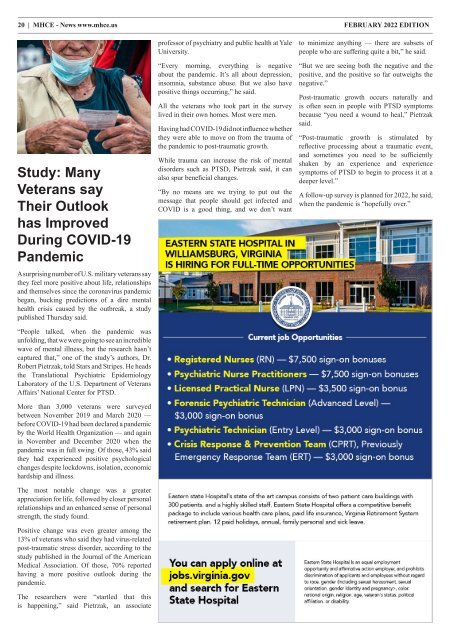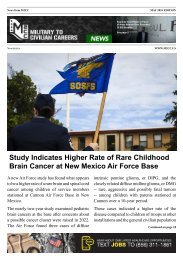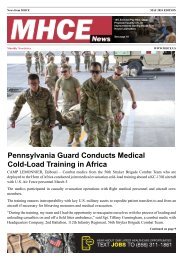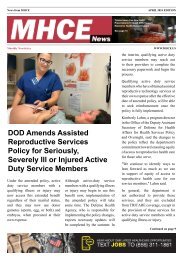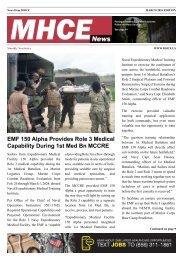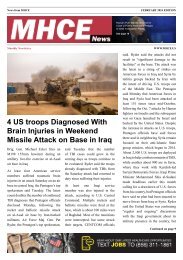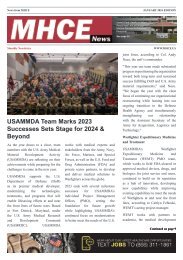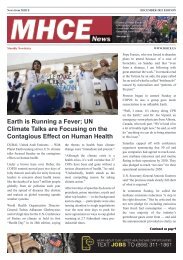February 2022 — MHCE Newsletter
You also want an ePaper? Increase the reach of your titles
YUMPU automatically turns print PDFs into web optimized ePapers that Google loves.
20 | <strong>MHCE</strong> - News www.mhce.us FEBRUARY <strong>2022</strong> EDITION<br />
Study: Many<br />
Veterans say<br />
Their Outlook<br />
has Improved<br />
During COVID-19<br />
Pandemic<br />
A surprising number of U.S. military veterans say<br />
they feel more positive about life, relationships<br />
and themselves since the coronavirus pandemic<br />
began, bucking predictions of a dire mental<br />
health crisis caused by the outbreak, a study<br />
published Thursday said.<br />
“People talked, when the pandemic was<br />
unfolding, that we were going to see an incredible<br />
wave of mental illness, but the research hasn’t<br />
captured that,” one of the study’s authors, Dr.<br />
Robert Pietrzak, told Stars and Stripes. He heads<br />
the Translational Psychiatric Epidemiology<br />
Laboratory of the U.S. Department of Veterans<br />
Affairs’ National Center for PTSD.<br />
More than 3,000 veterans were surveyed<br />
between November 2019 and March 2020 <strong>—</strong><br />
before COVID-19 had been declared a pandemic<br />
by the World Health Organization <strong>—</strong> and again<br />
in November and December 2020 when the<br />
pandemic was in full swing. Of those, 43% said<br />
they had experienced positive psychological<br />
changes despite lockdowns, isolation, economic<br />
hardship and illness.<br />
The most notable change was a greater<br />
appreciation for life, followed by closer personal<br />
relationships and an enhanced sense of personal<br />
strength, the study found.<br />
Positive change was even greater among the<br />
13% of veterans who said they had virus-related<br />
post-traumatic stress disorder, according to the<br />
study published in the Journal of the American<br />
Medical Association. Of those, 70% reported<br />
having a more positive outlook during the<br />
pandemic.<br />
The researchers were “startled that this<br />
is happening,” said Pietrzak, an associate<br />
professor of psychiatry and public health at Yale<br />
University.<br />
“Every morning, everything is negative<br />
about the pandemic. It’s all about depression,<br />
insomnia, substance abuse. But we also have<br />
positive things occurring,” he said.<br />
All the veterans who took part in the survey<br />
lived in their own homes. Most were men.<br />
Having had COVID-19 did not influence whether<br />
they were able to move on from the trauma of<br />
the pandemic to post-traumatic growth.<br />
While trauma can increase the risk of mental<br />
disorders such as PTSD, Pietrzak said, it can<br />
also spur beneficial changes.<br />
“By no means are we trying to put out the<br />
message that people should get infected and<br />
COVID is a good thing, and we don’t want<br />
to minimize anything <strong>—</strong> there are subsets of<br />
people who are suffering quite a bit,” he said.<br />
“But we are seeing both the negative and the<br />
positive, and the positive so far outweighs the<br />
negative.”<br />
Post-traumatic growth occurs naturally and<br />
is often seen in people with PTSD symptoms<br />
because “you need a wound to heal,” Pietrzak<br />
said.<br />
“Post-traumatic growth is stimulated by<br />
reflective processing about a traumatic event,<br />
and sometimes you need to be sufficiently<br />
shaken by an experience and experience<br />
symptoms of PTSD to begin to process it at a<br />
deeper level.”<br />
A follow-up survey is planned for <strong>2022</strong>, he said,<br />
when the pandemic is “hopefully over.”


